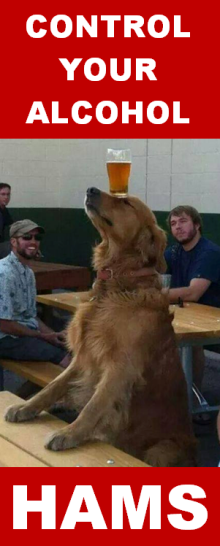In the late 1950s and the 1960s a battle was waged between researchers in Saskatchewan who were attempting to prove that LSD was an effective treatment for alcoholism and researchers in Toronto who were attempting to prove that it was not. Methodological flaws in the experiments on both sides of the argument make the results inconclusive. Then along came the war on drugs and research into this potentially effective treatment for alcoholism ground to a screeching halt before we had conclusive answers.
The Saskatchewan researchers began treating alcoholics with LSD in the 1950s and found that the subjects whom they treated with LSD appeared to have a much higher success rate at quitting drinking than what was accepted to be the rate of spontaneous remission for an untreated control group. The Saskatchewan group treated detoxified alcoholic subjects with a single dose of LSD followed by a debriefing session after the LSD trip ended.
The initial hypothesis of the Saskatchewan researchers was that LSD would produce effects similar to the DTs and that this would help alcoholics to 'hit bottom" and recover. However, this was soon replaced by the hypothesis that LSD gave alcoholics a spiritual experience and that it was this spiritual experience which led to recovery. In order to promote the spiritual experience of a good LSD trip the researches surrounded their subjects with things like music, flowers, and pictures during the LSD experience.
What was problematic about the research done by the Saskatchewan group was the fact that most of the Saskatchewan trials had no control group and simply made comparisons with the estimated rate of recovery of an untreated group. With no randomized controlled trials it is impossible to rule out the possibility of selectional bias. One exception was a study by Jenson (Jenson et al 1963) which found a statistically significant effect for LSD therapy: 63% of the LSD-treated group remained abstinent from alcohol compared to 27% of the untreated group (p < .01).
The Toronto group of researches was much better at providing control subjects in their research; however, the subjects in the Toronto studies were generally blindfolded and tied down to a hospital bed during the LSD experience which in all likelihood greatly decreased the chances of the spiritual experience associated with a good trip. The Toronto group found that the effect of LSD was not greater than that of a placebo; however, this tells us little because of their method of administering the LSD.
The experiment which would need to be conducted to give us conclusive evidence would require four groups of subjects:
- One given a placebo and tied to a bed and blindfolded
- One given LSD and tied to a bed and blindfolded
- One given a placebo and exposed to music and pictures and other things conducive to a good trip
- One given LSD and exposed to music and pictures and other things conducive to a good trip
This could give us conclusive results.
Other hallucinogens such as ibogaine and mescaline may also be effective treatments for addictions; further research is needed on these psychedelics as well.
On an interesting side note, Dr. Abram Hoffer--one of the Saskatchewan group--became a good friend of AA cofounder Bill Wilson and introduced Wilson to LSD therapy as well as Niacin therapy for alcoholism. Wilson experimented with LSD from 1956 to 1959. He first took it under the guidance of Gerald Heard.
REFERENCES:
Alcoholics Anonymous World Services, Inc. (1984). 'PASS IT ON': The story of Bill Wilson and how the A.A. message reached the world,
Blewett D. C. and Chwelos N. (1959). Handbook for the Therapeutic Use of Lysergic Acid Diethylamide-25, Individual and Group Procedures. Regina, Saskatchewan.
Free Full Text: http://www.erowid.org/psychoactives/guides/handbook_lsd25.pdf
Chwelos N, Blewett DB, Smith CM, Hoffer A. (1959). "Use of d-lysergic acid diethylamide in the treatment of alcoholism." Quart. J. Stud. Alcohol. 20:577.
http://www.ncbi.nlm.nih.gov/pubmed/13810249
Free Full Text: http://www.erowid.org/references/texts/show/1852docid1733
Denson R. and Sydiaha D. (1970), "A Controlled Study of LSD Treatment in Alcoholism and Neurosis." British Journal of Psychiatry. 115, 443-5.
http://www.ncbi.nlm.nih.gov/pubmed/4392561
Free Full Text: https://www.erowid.com/references/texts/show/4959docid4750
Erika Dyck. (2006). "'Hitting Highs at Rock Bottom': LSD Treatment for Alcoholism, 1950-1970." Social History of Medicine Vol. 19, No. 2 pp. 313-329.
Free Full Text: http://psychonautdocs.com/docs/dyck_hittinghighs.pdf
Hollister LE, Shelton J, Krieger G. (1969). "A controlled comparison of lysergic acid diethylamide (LSD) and dextroamphetamine in alcoholics." Amer. J. Psychiat. 125:1352-1357.
http://www.ncbi.nlm.nih.gov/pubmed/4886242
Free Full Text: http://www.erowid.org/references/texts/show/4815docid4608
Jensen SE, Ramsay R. (1963). "Treatment of Chronic alcoholism with lysergic acid diethylamide." Canad. psychiat. Assoc. J. 8:182-188.
http://www.ncbi.nlm.nih.gov/pubmed/13957649
Free Full Text: https://www.erowid.com/references/texts/show/2277docid2093
Jensen S. (1962). "A Treatment Program for Alcoholics in a Mental Hospital." Quarterly Journal of Studies on Alcohol, 23, 315-20.
http://www.ncbi.nlm.nih.gov/pubmed/14451676
Maclean JR, Macdonald DC, Byrne UP, Hubbard AM. (1961). "The Use of LSD-25 in the Treatment of Alcoholism and Other Psychiatric Problems." Quart.J.Stud.Alcohol. 22:34-45.
http://www.ncbi.nlm.nih.gov/pubmed/13764952
Free Full Text: http://www.erowid.org/references/texts/show/1988docid1852
O'Reilly PO, Reich G. (1962). "Lysergic acid and the alcoholic." Dis. nerv. Syst. 23:331-334.
http://www.ncbi.nlm.nih.gov/pubmed/14480914
Free Full Text: http://www.erowid.org/references/texts/show/2213docid2054
O'Reilly PO, Funk A. (1964). "LSD in chronic alcoholism." Canad. Psychiat. Assoc. J. 9:258-261.
http://www.ncbi.nlm.nih.gov/pubmed/14154310
Free Full Text: http://www.erowid.org/references/texts/show/2331docid2130
Smart RG, Storm T, Baker EF, Solursh L. (1966). "A controlled study of lysergide in the treatment of alcoholism. 1. The effects on drinking behavior." Q J Stud Alcohol. 27(3):469-82.
http://www.ncbi.nlm.nih.gov/pubmed/5970697
Free Full Text: http://www.erowid.org/references/texts/show/4543docid4351
Smart RG, Storm T. (1964). "The efficacy of LSD in the treatment of alcoholism." Q J Stud Alcohol. 25:333-8.
http://www.ncbi.nlm.nih.gov/pubmed/14161796
Free Full Text http://www.erowid.org/references/texts/show/2335docid2134
Smith CM. (1958). "A new adjunct to the treatment of alcoholism: The hallucinogenic drugs." Quart. J. Alcohol. 19:406-417.
http://www.ncbi.nlm.nih.gov/pubmed/13579169
Free Full Text: http://www.erowid.org/references/texts/show/1699docid1582
Smith CM. (1959). "Some Reflections on the Possible Therapeutic Effects of the Hallucinogens with Special Reference to Alcoholism." Quart.J.Stud.Alcohol. 20:292-301.
http://www.ncbi.nlm.nih.gov/pubmed/13668045
Free Full Text: http://www.erowid.org/references/texts/show/1981docid1845
Van Dusen W, Wilson W, Miners W, Hook H. (1967). "Treatment of alcoholism with lysergide." Quart. J. Stud. Alcohol. 28:295-303.
http://www.ncbi.nlm.nih.gov/pubmed/6049171
Free Full Text: http://www.erowid.org/references/texts/show/3900docid3457



